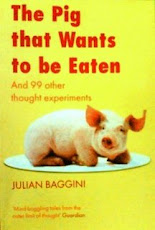Synopsis - Minority Report the movie sort of covers it. The police predict who's going to commit a crime and arrest them before they do it. Though crime is down by staggering numbers, some feel that it isn't right to punish people for crimes not yet committed.
It is a very good, cool movie. A peek into the future where cars you don't need to drive park in your apartment, holograms follow you in a store, and your eyes let the world know your past and present.
And like in the movie, things started going wrong when evil people in charge of the predicting waifs did bad things, did more bad things to cover up their folly and hence manipulated justice.
So the basics - is it ok to lock people up for a future crime? This is one of those situations where the folks in favour of this system assume that they are the best people to make that decision, that they are morally and ethically superior and they would never be arrested under this system. And that's a problem. We assume the profiles of criminals quite readily. Uneducated riff raff from broken homes are the ones responsible for all thefts, murders and shootups, perhaps all evil intent. Today's crimes are also not so basic. Theft and murders are biblical wrongdoings, and fail in complexity to white collar hoodwinking, cyberattacks and intercontinental mafia gangland drug-fuelled vendettas. Smart people commit smarter crimes. Who are we then to judge the goodness of man?
Trust is an important issue. Can we trust the 'machine' that predicts the crime and criminal so accurately? Just because it had provided precise 'hits' so far, it doesn't mean it's not infallible. If it started to make mistakes, would we recognize them? How far along would the police go before innocents were errorneously but unwittingly put behind bars? Will we be committing one crime to supposedly prevent another?
If a machine, trusted without exception, told someone that he'd be committing a crime next week and would now be arrested, could it be seeding the thought in this person instead of properly assessing the threat? With the seed, this person might come to believe that he actually would have committed a crime in the future. From 'no wat' we might get 'maybe' which then would, under the right psychological conditions, stretch to a 'yes I did it, no, I would have done it! Oh I am a bad person. Oh thank you machine for preventing this tragedy!' Well maybe.
I'm more for innocent till proven guilty or a confession is tortured out (kidding). Crossing this line is tricky ground and almost no legal system would enjoy treading on highly circumstantial ground.
Monday, March 22, 2010
Subscribe to:
Post Comments (Atom)
.jpg)
No comments:
Post a Comment